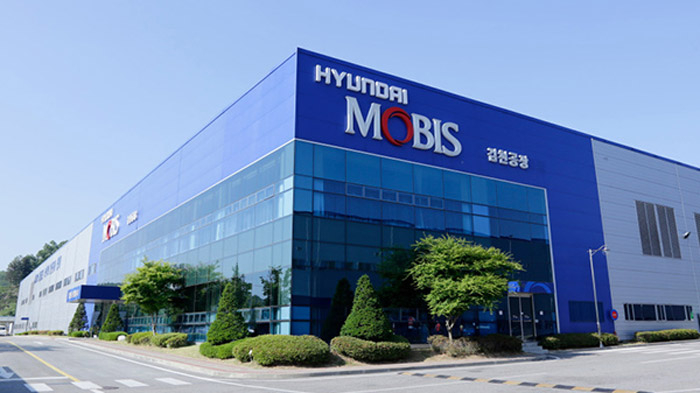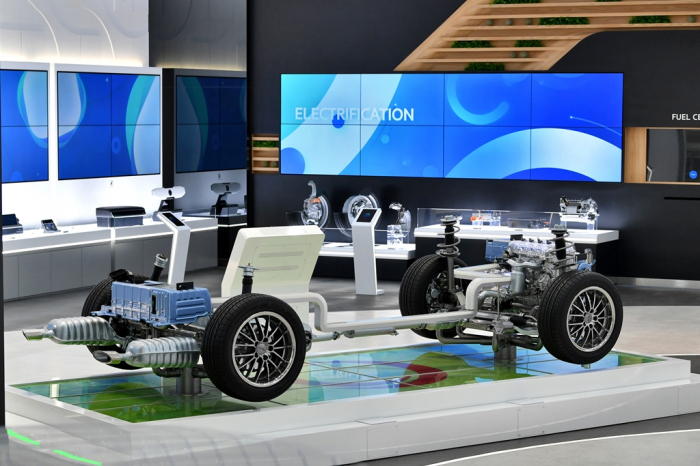Korean auto parts makers’ earnings ride on electrification push
Their diversified client base will also boost their sales growth, although low profitability remains a challenge
By Apr 25, 2023 (Gmt+09:00)
LG Chem to sell water filter business to Glenwood PE for $692 million


Kyobo Life poised to buy Japan’s SBI Group-owned savings bank


KT&G eyes overseas M&A after rejecting activist fund's offer


StockX in merger talks with Naver’s online reseller Kream


Mirae Asset to be named Korea Post’s core real estate fund operator



South Korea’s major automotive parts makers are expected to post decent growth in their first-quarter sales and earnings on the back of their diversified client base and carmakers’ push for electrification.
According to financial information provider FnGuide on Tuesday, Korea’s six big auto parts makers – Hyundai Mobis Co., Hyundai Wia Corp., Hanon Systems Corp., SL Corp., Seoyon E-Hwa Co. and HL Mando Corp. – are expected to post combined sales of 21.75 trillion won ($16.3 billion) in the January-March quarter, up 19.1% from the year-earlier period.
The six companies’ combined operating profit is forecast to rise 40.3% year on year to 833 billion won.
HL Mando, formerly Mando Corp., announced its first-quarter results last week.
The company’s sales gained 18.3% on year to nearly 2 trillion won while its operating profit rose 1.8% to 70.2 billion won, both beating market consensus.
Mando’s solid performance was due to the easing of the automotive chip shortage and elevated logistics costs, which plagued the car industry up until the first half of 2022.

DIVERSIFIED CLIENT BASE
The company’s efforts to diversify its client portfolio have also contributed to its earnings and sales growth.
HL Mando’s two biggest clients, Hyundai Motor Co. and Kia Corp., accounted for 50.2% of its entire sales in the first quarter, down from 55.5% at the end of 2021 and 59.3% at the end of 2019.
Hanon Systems is expected to post an 8.6% on-year sales increase to 2.15 trillion won and a 91.8% operating profit rise to 58.5 billion won when it reports its first-quarter results on May 11.
For the full year, the company is forecast to post record sales of 9.08 trillion won, analysts said.
Hanon manufactures and sells a wide range of products, including air conditioners, heaters, cooling modules and compressors. The company is the world's No. 2 thermal management systems supplier for automakers.
In the electric vehicle era, superior thermal management systems are essential to regulating energy efficiency. The growing EV market is expected to increase demand for Hanon's battery thermal management systems, analysts said.
Hanon's high-profile clients include Hyundai Motor and Kia alongside global auto firms such as Ford, Volkswagen, GM and Tesla.
“German carmakers such as Volkswagen, BMW and Mercedes-Benz account for a big share of Hanon’s sales. With the global push for electrification, Hanon’s growth rate will accelerate,” said Daol Investment & Securities analyst Yoo Ji-woong.
SL and Seoyon E-Hwa, which largely supply their auto part products to Hyundai Motor Group, are expected to post double-digit growth in their quarterly sales and operating profit.

CHALLENGING PROFITABILITY
Korean auto parts makers are also expected to benefit from Hyundai Motor Group’s stellar performance.
Hyundai Motor and Kia are widely said to be posting higher earnings than Samsung Electronics Co., driven by robust sales of pricey cars.
Hyundai Mobis, Korea’s largest auto parts maker, is expected to post 13.6 trillion won in first-quarter sales, up 20.3% from a year ago.
Its operating profit is estimated at 556.4 billion won, up 43.8%. The company will report its first-quarter results on Wednesday.
“With Hyundai Motor and Kia’s EV shipments up 75% in the first quarter, Hyundai Mobis’ electrification-related revenue will reach 3.4 trillion won in the first quarter alone,” said Shinyoung Securities in a research note.
Low profitability remains a challenge for most Korean auto parts makers.
The six companies’ profit margins, which averaged 3.8% at the end of 2022, are expected to rise to 4.5% by the end of this year. At that level, however, their profitability still lags behind their global peers, analysts said.
Write to Nan-Sae Bin at binthere@hankyung.com
In-Soo Nam edited this article.
-
 AutomobilesHyundai Mobis test-drives 'crab walking car' on public roads
AutomobilesHyundai Mobis test-drives 'crab walking car' on public roadsApr 24, 2023 (Gmt+09:00)
1 Min read -
 AutomobilesHyundai Mobis develops world’s first rollable vehicle display
AutomobilesHyundai Mobis develops world’s first rollable vehicle displayApr 17, 2023 (Gmt+09:00)
2 Min read -
 AutomobilesHyundai Motor to emerge as Korea’s highest earner, beating Samsung
AutomobilesHyundai Motor to emerge as Korea’s highest earner, beating SamsungApr 03, 2023 (Gmt+09:00)
3 Min read -
 Leadership & ManagementAMCHAM head James Kim joins Hyundai Mobis as outside director
Leadership & ManagementAMCHAM head James Kim joins Hyundai Mobis as outside directorFeb 15, 2023 (Gmt+09:00)
2 Min read -
 LogisticsHyundai Mobis to build $69 mn integrated logistics center in Korea
LogisticsHyundai Mobis to build $69 mn integrated logistics center in KoreaNov 10, 2022 (Gmt+09:00)
1 Min read -
 Hanon Systems eyes top spot in world’s car thermal management system market
Hanon Systems eyes top spot in world’s car thermal management system marketAug 12, 2020 (Gmt+09:00)
2 Min read


